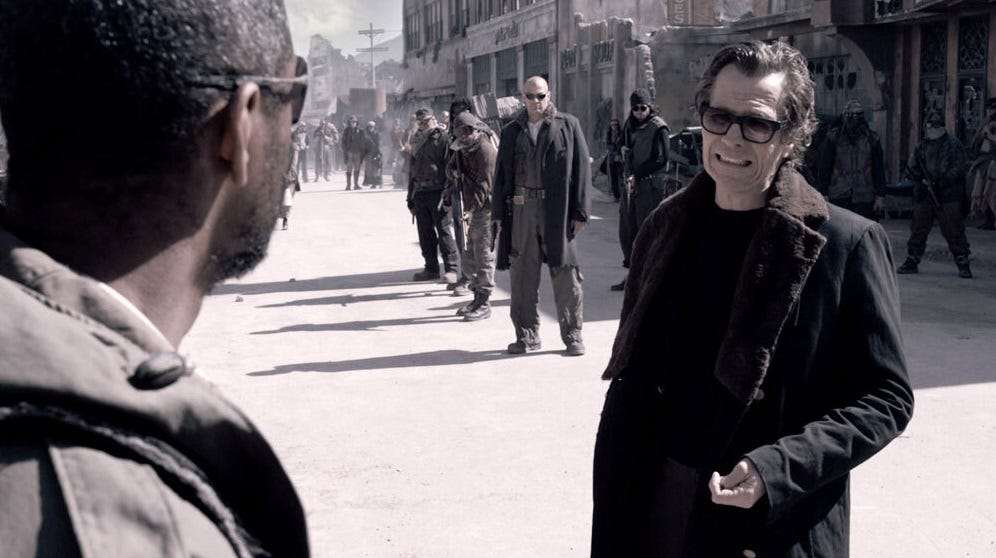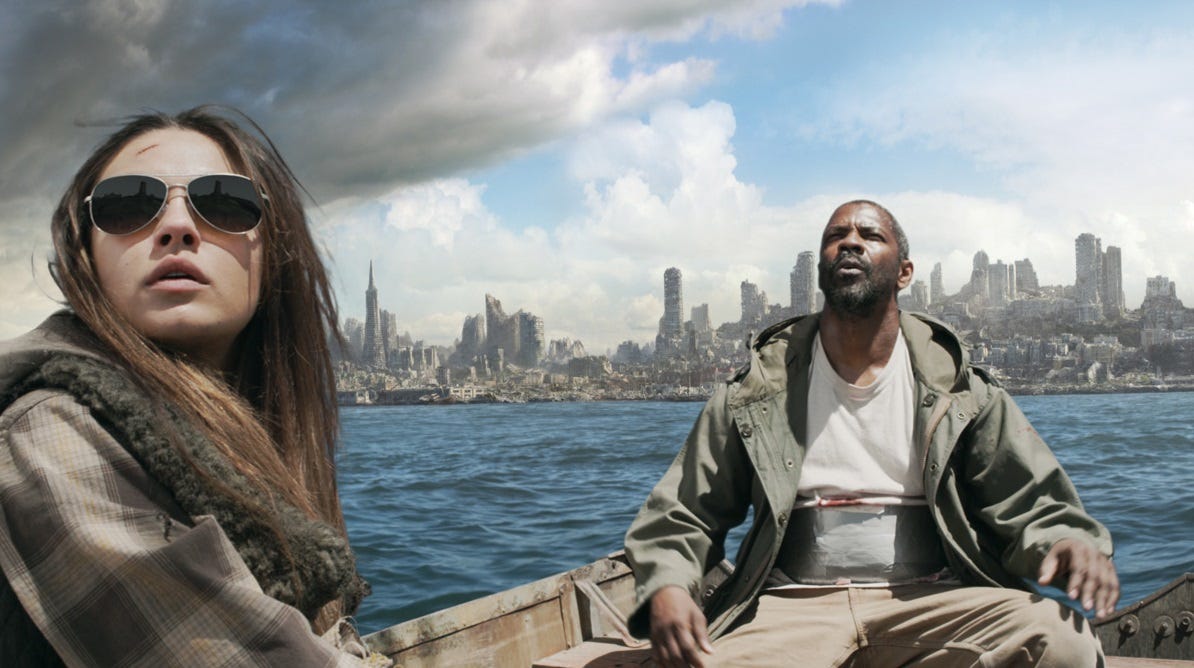A key component of Christian faith is that God is able to preserve his word. No matter what could possibly happen, no matter how many book-burnings, censorings, or ideological cleansings there might be, the Christian has to believe that the God who speaks in history is also able to protect the record of his speaking, and that the Bible will never be able to be entirely forgotten or lost. That is easy to believe in our present age—certain countries might ban the circulation and distribution of the Bible, but there are other countries where the Bible is freely distributed and read. But let’s take the argument to its logical extreme: what if there were only one copy of the Bible left on the entire earth? What would it mean for God to preserve that copy? This is the question asked by the Hughes Brothers’ 2010 film The Book of Eli.
Many years after a vague apocalypse, Eli walks the earth alone. He lives off the land, and he is not to be trifled with—his skill with weapons is fearsomely precise, as he dispatches bandits and robbers along his way. The beginning of the film slowly reveals the backstory of the scenes we are witnessing: sometime in the dim-but-still-remembered past, the earth suffered a cataclysmic nuclear war, the results of which include the Earth’s atmosphere being damaged, and the ground scorched and bereft of most life. It is hinted that the war was religiously motivated. We don’t learn much about Eli, however, except that he is on a mission, although all he will say about his mission is that he must go west.
Eli crosses paths with Carnegie, a small-time chieftain whose quest for power is centered on his search for a long-lost book which, he says, is the key to power and success in this world; although he doesn’t explicitly say so, we viewers know he is looking for a copy of the Bible. It turns out that all known copies were destroyed in the war that happened many years ago. Carnegie obsessively searches for any remaining copies of the Bible; his plan is to use it to inspire the people around him to recreate “civilization”. But what will Carnegie’s civilization look like? Like so many power-hungry warlords throughout history, Carnegie plans to use the Bible to control other people, instead of letting it touch his life first. Eli, on the other hand, brings true civilized manners with him wherever he goes—he refuses Solara, whom Carnegie had sent to Eli’s room for his sexual gratification, instead teaching her how to pray before eating. He accidentally lets her see a book he is carrying with him; when Solara reports to Carnegie on the events of the past night, Carnegie realizes that Eli has a copy of the Bible in his possession—the only Bible Carnegie has ever known still in existence.
Most of the rest of the film recounts Carnegie’s attempts to wrest the Bible away from Eli’s possession; Eli, however, still doggedly continues his journey west, now accompanied by Solara. Along the way, they talk of why he is journeying west; he says he was led by a voice to take the book to a place in the west where it would be safe. He reads from the Bible to her, and explains its strange importance in his life.
But when Carnegie finally catches up to them, disaster strikes. Carnegie manages to force Eli to choose between keeping the Bible and saving Solara’s life. Eli gives up the Bible, at which point Carnegie shoots him. But with Solara’s help, Eli struggles onward, continuing his journey.
Back at his compound, Carnegie realizes that the Bible Eli was carrying was printed in braille, and he will not be able to use it; his scheme to become a mighty, Bible-wielding ruler are dashed completely. Meanwhile, Eli and Solara have reached what was formerly San Francisco; at a facility on Alcatraz Island, Eli reveals that he has memorized the entire Bible, and proceeds to dictate it to the facility’s staff, who then print another paper copy.
. . . And that, this movie is telling us, is how God could preserve his word if even only one copy was left. Certainly, there are places in the film which stretch credulity, and the whole thought experiment could be considered as frivolous. Would God even allow such a state of affairs to happen? But I think it’s worthwhile to reflect upon what it means for the Bible to be preserved. The Bible is the most translated book in the world, the most frequently printed, the top bestseller, etc. Is this all just the result of coincidence? Or is it evidence that God is, indeed, interested in promoting the record of his message to the people of the world?
It is interesting to reflect, also, on Eli’s attitude toward the Bible he is carrying, not just in his backpack but in his mind as well. It is a severe test of his faith when he has to give up his Bible to preserve Solara’s life. But this is what he says about it, after Solara blames herself for the loss of the Bible: “All the years I’ve been carrying it and reading it every day, I got so caught up in keeping it safe I forgot to live by what I learned from it—do for others more than you do for your self. That’s what I got from it anyway.” For Eli, the Bible is not merely an object that he must keep safe; it is also a living text, relevant to his own life, and with the power to change those who encounter it. This is how Carnegie saw it also, but he thought he could use it for his own ends. Eli knows that the Bible is bigger than any agenda we want to use it for; its power comes not from how we use it, but from the One who created it.
In the end, the most moving tribute to the Bible’s power comes from Eli’s simple prayer at the end, before he dies. “Dear Lord, thank you for giving me the strength and the conviction to complete the task you entrusted to me.” Indeed, Eli’s conviction, that he was divinely appointed to carry the Bible west, was at the heart of his psychological makeup, giving him determination but also humility. That conviction—that faith—is what sets him apart from Carnegie.







When I first watched this film, I had no preconceptions. I did not 'know' that the 'book' was the Bible... and I did not know Eli was blind. Perhaps that eventual 'understanding' has influenced my opinion of this film. It is one of my absolute favorites. Your review is excellent. There are also so many other key threads. Eli is blind without his faith. We see a metaphor for evangelism that is better than our tract-giving condemnation. Anyway, thanks, sir for this review.